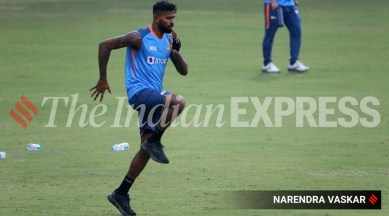📣 For more lifestyle news, click here to join our WhatsApp Channel and also follow us on Instagram
Hardik Pandya struggles with ‘stiff glutes’ during match due to lack of water, sleep; know how these affect your muscles
"I did not sleep well, did not drink enough water and hence the glutes were stiff. I was unwell and I had my fluids down,” Hardik said during the presentation ceremony after winning the first T20 against Sri Lanka

Hardik Pandya gave an injury scare during the first T20I match against Sri Lanka at Mumbai’s Wankhede Stadium when he did not look comfortable while bowling his third over. He was seen touching his back constantly, and also took a fall while taking a catch during the match, which India eventually won by two runs. Later, during the post-match presentation, Pandya however confirmed that there was nothing major and that he was just cramping up due to lack of water. “It is just cramps. Now, I have a tendency to scare people. I did not sleep well, did not drink enough water and hence the glutes were stiff. I was unwell and I had my fluids down,” Hardik said during the presentation.
For the unversed, the glutes are one of the densest and strongest muscles in the body, whose primary function is hip extension. “Apart from that, hip abduction and external hip rotation are also functions that these muscles can perform,” said Rachit Dua, co-founder of Fitpathshala, adding that the stronger the glutes, the better will be our ability to run, sprint, squat, and deadlift etc.
monthly limit of free stories.
with an Express account.
Can lack of water cause stiff glutes?
Water, the main component of the body — about 70-80 per cent — is distributed in the extracellular and intracellular compartments of the body, said Dr Udit Kapoor, consultant, Metro Hospital, Faridabad.
“Water exchange between these compartments is mainly governed by osmotic pressure. Intracellular water content in lean mass has been related to muscle strength, functional capacity, and frailty risk, and has been proposed as an indicator of muscle quality and cell hydration. This simply means, just a two per cent reduction in the amount of water in your body can cause a slight shrinkage of the brain, resulting in decreased concentration and neuromuscular coordination,” Dr Kapoor told indianexpress.com.
Referring to studies that have shown how water helps improve every system in the body, including the digestive system, kidneys, skin, teeth, and bones, and joints including the glutes, Dr Kapoor said that water also transports the nutrients needed for producing protein and glycogen structures, the building blocks of muscles in the body, and helps to gain muscles strength.
Additionally, hydration is extremely important for an athlete, stressed Dr Richa Kulkarni, chief consulting and sports physiotherapist, Dr Richa’s KINESIS Sports Rehab and Physiotherapy Clinic, Pune. “If one’s hydration level is below average, it may lead to dehydration and can cause major or minor cramps in the body, which can turn into an injury if neglected,” said Dr Kulkarni, adding, “such discomfort can be experienced in any part of the body, or the part that is most overused at that time.”
Does sleep affect the glutes, too?
According to Dr Kulkarni, glutes can become stiff if “slept in the wrong posture” or if the “mattress is not proper”.
Poor sleep quality, or not having proper REM (resting eye movement) sleep and short sleep duration are associated with an increased risk for muscle mass reduction, Dr Kapoor said.
“Skeletal muscle is a primary regulator of human metabolism. Acute sleep deprivation decreases muscle protein synthesis in young, healthy males, and females. Acute sleep deprivation promotes a catabolic hormonal environment (or hormones that are known to breakdown energy sources). “Low muscle mass is a hallmark of and precursor to a range of chronic health conditions, including neuromuscular disease, sarcopenia and frailty, obesity, and type II diabetes,” Dr Kapoor said.
📣 For more lifestyle news, follow us on Instagram | Twitter | Facebook and don’t miss out on the latest updates!
📣 For more lifestyle news, click here to join our WhatsApp Channel and also follow us on Instagram